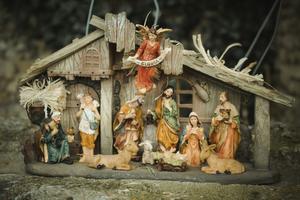Like the Magi, May We Seek Out Christ
User’s Guide to the Epiphany of the Lord

Sunday, Jan. 5, is the Epiphany of the Lord. Mass readings: Isaiah 60:1-6; Psalm 72:1-2, 7-8, 10-11, 12-13; Ephesians 3:2-3a, 5-6; Matthew 2:1-12.
There are so many wonderful details in the Epiphany story: the call of the Gentiles, their enthusiastic response, the significance of the star they seek, the gifts they bring, the dramatic interaction with Herod, and their ultimate rejection of Herod in favor of Christ.
The text says, “Behold, magi from the east arrived in Jerusalem, saying, ‘Where is the newborn king of the Jews? We saw his star at its rising and have come to do him homage.’”
Who were the Magi? Whether learned men, ancient astronomers or kings, this is their key identity: They are Gentiles who have been called. Up until this point in the Christmas story, only Jews had found their way to Bethlehem. This call completes the Church, which needs both Jews and Gentiles. St. Paul rejoices in this fact, saying, “the Gentiles are coheirs, members of the same body, and co-partners in the promise in Christ Jesus through the gospel” (Ephesians 3:6).
Notice that God calls them through something in the natural world: a star. We do well to wonder: What is the “star” that God used to call each of us? Perhaps it is Scripture, but more typically God uses someone in our life in order to reach us: a parent, a family member, a friend, a priest, a religious sister or a devoted layperson. Who are the “stars” in your life through whom God called you?
The Magi travel nearly 600 miles to reach Jerusalem. Upon arriving in Jerusalem, the Magi find a rather confusing and perhaps discouraging situation. The reigning king, Herod, knows nothing of the birth of this new King and seems threatened and agitated. Herod calls religious leaders to get further information about this new King. But they seem unenthusiastic. Perhaps the Magi even thought about abandoning their search. After all, the actual king knew nothing of this new King’s birth, and those people who did know about it seemed rather uninterested. But they persevered in their search; they did not give up!
The trio find Jesus, with his mother, Mary. And they “prostrate” themselves before Jesus. The Greek word means “to fall down in worship” or “to give adoration.” This is no minor act of homage or sign of respect to an earthly king; this is religious worship. It is a confession of faith. To this faith they offer suitable and costly gifts: gold, which symbolizes all our possessions; frankincense, which symbolizes the gift of our worship; and myrrh, a kind of burial ointment that symbolizes the gift of our own life. To Jesus, we are saying, “My life is yours. I want to die so that you may live your life in me.”
The text says, “And having been warned in a dream not to return to Herod, they departed for their country by another way.”
These Wise Men’s journey is different now. They are not going home by the same way they came. They’ve changed direction and turned around (conversio). No longer mere magi, they are now wise men who are walking up the King’s highway.
















